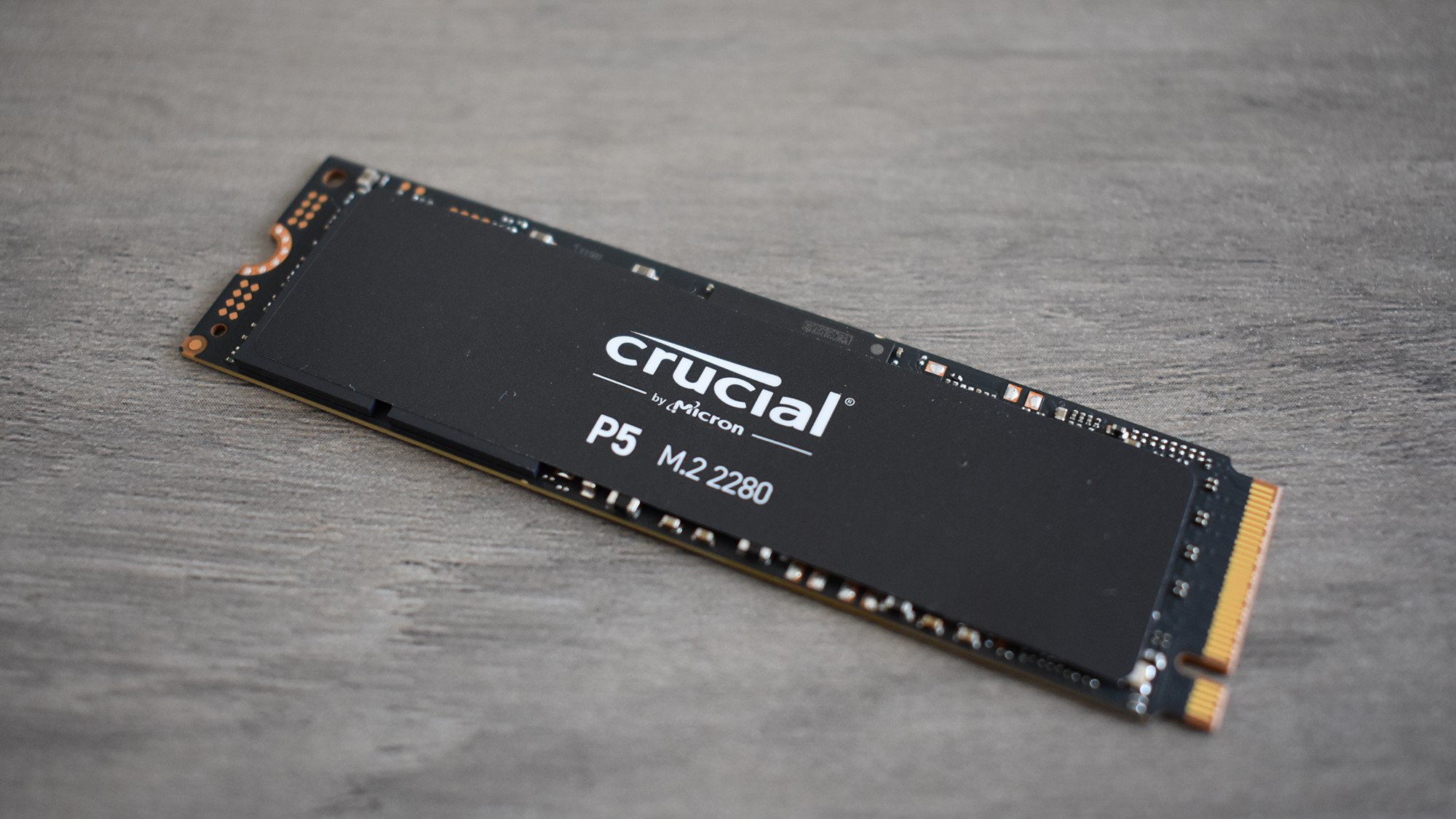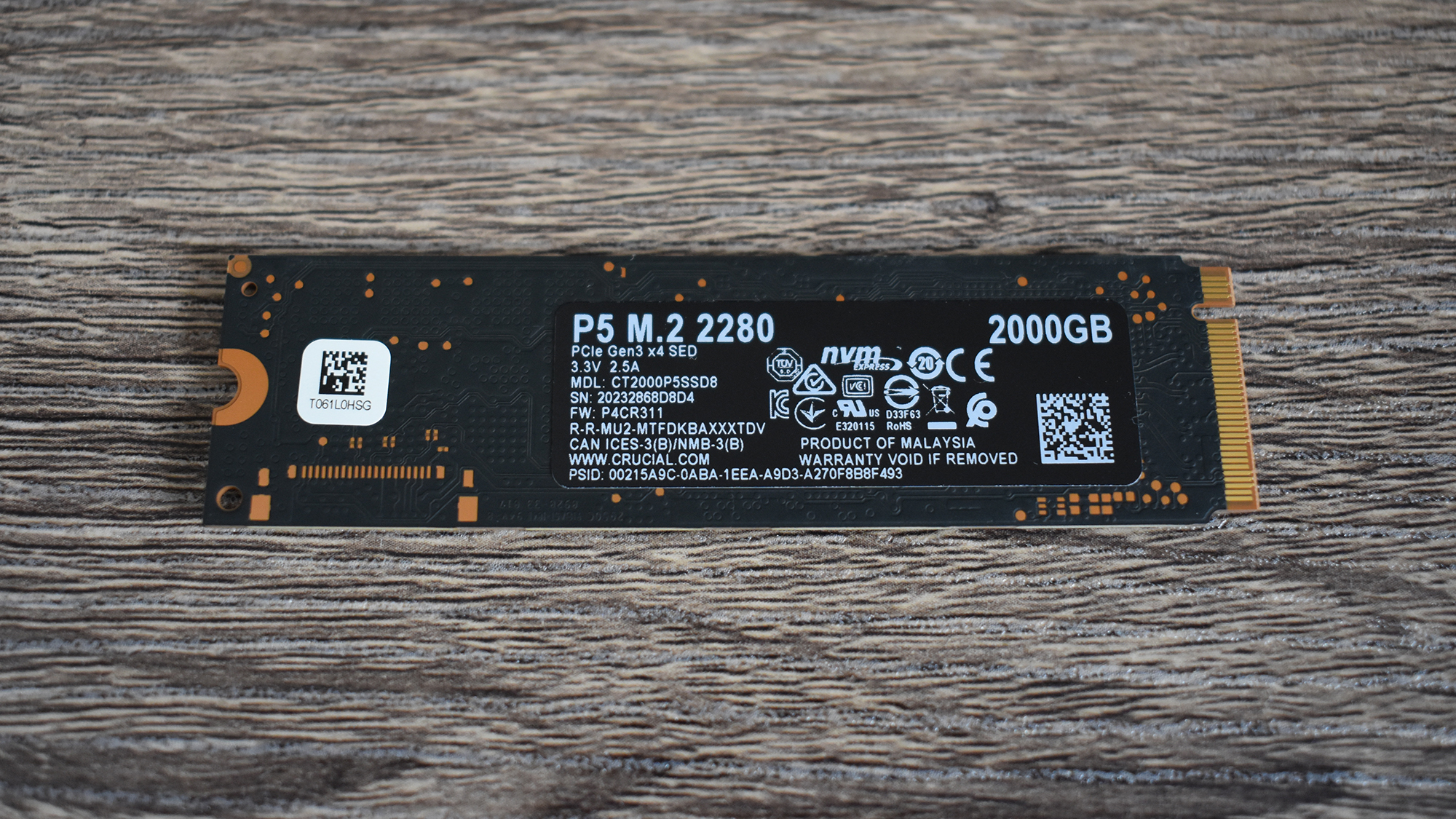Crucial P5 review: High-end speeds at lower prices
It’s not the quickest SSD on the market, but the Crucial P5 is fast and feature-rich for the money


-
+
Great write speeds
-
+
Cheaper than rivals
-
+
Single-sided 2TB model
-
-
Some alternatives faster overall
Crucial’s latest NMVe SSD launch is a pincer attack: in addition to the budget-minded P2, it’s simultaneously released the P5, a high-end drive for those who need and can afford the best storage performance. Or, at least, the best that the PCIe 3.0 interface can allow.
This means 96-layer TLC memory, with a controller developed in-house by parent company Micron, allegedly reaching read and write speeds of 3,400MB/sec and 3,000MB/sec respectively. Unlike the P2, the P5 also supports Opal 2.0, enabling full drive encryption – so it’s already much better-suited to professional environments.
Naturally, the P5 costs a lot more, but for most capacities it’s actually cheaper than you might expect for a premium M.2 drive. The smallest 250GB model works out at 16.9p exc VAT per gigabyte, and it only gets cheaper from there, with the 500GB model and the 2TB model – the one we’re testing – only coming in at 12.5p and 13.1p per gigabyte respectively. Best of all is the 1TB model, at a very attractive 11.5p per gigabyte.
Even if you only care about the initial outlay, the P5 proves itself quite the money-saver next to similarly specced SSDs. The recent Kingston KC2500, for instance, will set you back £304 for its 2TB version, over £40 more than the P5. Meanwhile, the 2TB Samsung 970 Evo Plus is even costlier, at £329 exc VAT.
And, when the P5 is running at full pelt, it’s easy to wonder why anyone would choose anything else. In CrystalDiskMark’s sequential tests, it produced a 3,420MB/sec read speed and a 3,243MB/sec write speed, exceeding Crucial’s official figures on both counts. The 970 Evo Plus was slightly faster but arguably not enough to deserve its price premium, while the KC2500 fell well behind on write speed. The P5 also bested Kingston’s SSD in the much tougher 4K random test, ending with a highly respectable 460MB/sec read speed and a 417MB/sec write speed.

Unfortunately, in our file transfer tests – which more closely recreate everyday Windows usage than CrystalDiskMark’s synthetic benchmarks – the P5 dropped off somewhat. That’s not to say it’s slow, or anywhere near it: with an average read speed of 1,773MB/sec and an average write speed of 1,857MB/sec in the huge file test, it’s faster than most PCIe 3.0 SSDs. Even so, the KC2500 managed an even faster 1,987MB/sec read speed, while keeping pace on writes.
In the large files test, the P5 did well to average a 1,554MB/sec read speed and a 1,649MB/sec write speed; writing in general seems a particular strength. Again, though, the KC2500 outpaced it with a 1,798Mb/sec read speed and a 1,809MB/sec write speed, and also beat the P5’s results in the final, hardest small files test – 1,015MB/sec read, 1,445MB/sec write – by similar margins.
That’s enough to put the KC2500 on top for overall performance, but context is kind to the P5. Not only is it significantly cheaper, but unlike both the KC2500 and 970 Evo Plus, it squeezes its highest capacities – including 2TB – onto a single-sided design, allowing it to be used in more space-limited systems like ultraportable laptops.
As such, it manages to remain a viable option, even in a market that’s already well-stocked with excellent SSDs.
Crucial P5 specifications
| Capacity | 2TB |
| Cost Per Gigabyte | 13.1p |
| Interface | NVMe |
| Claimed Read | 3,400MB/sec |
| Claimed Write | 3,000MB/sec |
| Warranty | Five years RTB |
| Details | uk.crucial.com |
| Part Code | CT2000P5SSD8 |
Get the ITPro daily newsletter
Sign up today and you will receive a free copy of our Future Focus 2025 report - the leading guidance on AI, cybersecurity and other IT challenges as per 700+ senior executives
-
 ‘Phishing kits are a force multiplier': Cheap cyber crime kits can be bought on the dark web for less than $25 – and experts warn it’s lowering the barrier of entry for amateur hackers
‘Phishing kits are a force multiplier': Cheap cyber crime kits can be bought on the dark web for less than $25 – and experts warn it’s lowering the barrier of entry for amateur hackersNews Research from NordVPN shows phishing kits are now widely available on the dark web and via messaging apps like Telegram, and are often selling for less than $25.
By Emma Woollacott Published
-
 Redis unveils new tools for developers working on AI applications
Redis unveils new tools for developers working on AI applicationsNews Redis has announced new tools aimed at making it easier for AI developers to build applications and optimize large language model (LLM) outputs.
By Ross Kelly Published
-
 Google layoffs continue with "hundreds" cut from Chrome, Android, and Pixel teams
Google layoffs continue with "hundreds" cut from Chrome, Android, and Pixel teamsNews The tech giant's efficiency drive enters a third year with devices teams the latest target
By Bobby Hellard Published